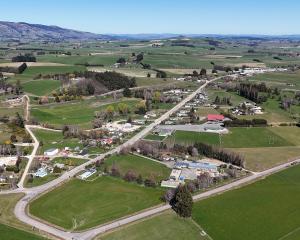
However, a city councillor argues shaping a climate-resilient future need not get in the way of local solutions.
The differing perspectives came from Cr Steve Walker and Future Dunedin political ticket leader and mayoralty hopeful Andrew Simms, while Crs Sophie Barker and Lee Vandervis — another mayoralty candidate — also weighed in.
Mr Simms noted it had been 10 years since a large flood in South Dunedin, and he lamented lack of progress in implementing key recommendations from a 2017 report by Opus about stormwater.
The South Dunedin Future programme was set up by the Dunedin City Council and the Otago Regional Council after the flooding and it is principally about responding to climate change and natural hazards through a long-term plan under development.
Mr Simms characterised the programme as offering "a long-term, billion-dollar response to gradual sea-level rise and climate change".
"But the Opus report focuses on what South Dunedin urgently needs right now: practical, immediate solutions to mitigate flooding caused by an overwhelmed drainage system."
Future Dunedin would advocate for Opus to update its proposals for the council, "to ensure decisions are grounded in sound engineering, not just long-term vision", Mr Simms said.
He and Future Dunedin council candidate Conrad Stedman had talked to stormwater engineers and South Dunedin residents and "listened to longtime Surrey St residents whose showers back up with sewage during heavy rain".
"We acknowledge the challenges of climate change, but Dunedin ratepayers’ money should be spent firstly on solving Dunedin’s problems, before we embark on saving the world."
Cr Walker took issue with the way Mr Simms had framed matters, describing some aspects as misleading.
The city council had directed money to immediate issues faced by South Dunedin and there was no agenda to prioritise international climate goals at the expense of local resilience, he said.
Cr Walker said work could be done to deal with immediate problems for low-lying communities and shaping a climate-resilient future — "one doesn’t have to come at the expense of the other".
"While short-term, temporary fixes may look politically attractive, we should caution against knee-jerk reactions if it puts at risk, financially impinges on, or delays the longer-term planning identified in the excellent [South Dunedin Future] programme."
Cr Barker said Future Dunedin’s position was not greatly at odds with the council’s.
"While we need to look at the long term and our climate adaptation work, we also need action now to stop people’s homes flooding and minimise damage," she said.
Dunedin Mayor Jules Radich particularly pushed for a multimillion-dollar package for immediate mitigation and the council voted this year in support of it.
Cr Vandervis said sewage erupting in Surrey St without a fix was unforgivable.
However, northern parts of the city should not be forgotten and flooding there had historically been more damaging, he said.
"Flood events in Dunedin can never be entirely controlled, but having a historically informed overview of all Dunedin flood vulnerability should spread limited resources proportionately to protect the majority of Dunedin residents and businesses."











